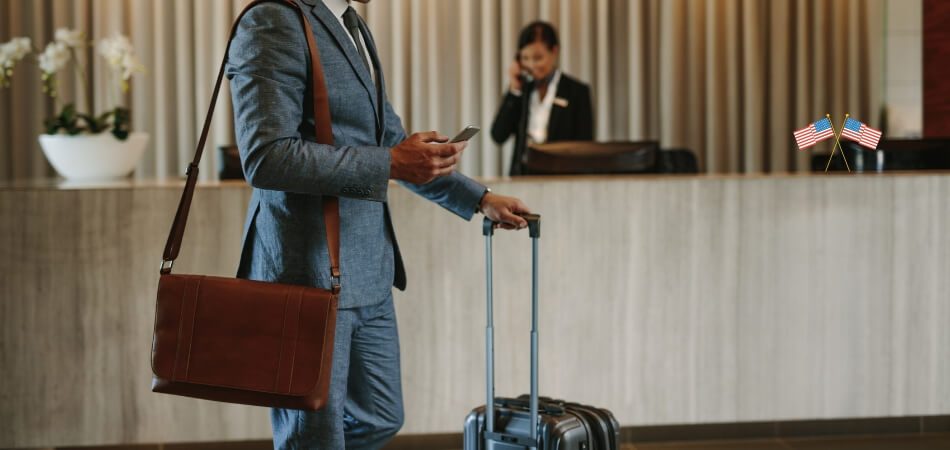Extending your visa stay in the USA is a possibility for many travelers, but it comes with certain conditions. You may apply to extend your stay while you are in the U.S., granting you the opportunity to continue enjoying the experiences the country has to offer.
However, you should be aware that this process requires proactive action, as the extension must be sought before your visa expires. Not all visa categories are eligible for an extension, which makes understanding your specific visa’s eligibility crucial.
So, if you still wonder, “Can I extend my visa stay in the USA?” it’s essential to dive into the ins and outs of your visa type and adhere to the timeline to ensure a smooth and legally compliant transition.
Visa Systems in the USA – The Secret Should You Know
International travelers must be able to manage the complex visa systems in the USA, especially when planning to attend an upcoming conference in USA. These systems categorize visas into two main types: immigrant and non-immigrant. Immigrant visas are intended for those seeking permanent residence, while non-immigrant visas are temporary, catering to various purposes such as tourism, business, and education.

Non-immigrant visas encompass various categories, each designed for specific activities or intentions. The B-1 visa is suitable for business purposes, while the B-2 visa covers tourism and leisure travel. Students often opt for the F-1 visa, and professionals with specialized skills can apply for the H-1B visa.
Immigrant visas are issued through family-sponsored, employment-based, and diversity lottery programs. Family-sponsored visas enable close relatives of U.S. citizens or permanent residents to immigrate.
Employment-based visas, on the other hand, cater to skilled workers, investors, and individuals with exceptional abilities. The Diversity Visa Lottery provides a limited number of visas to citizens of countries with historically low immigration rates to the U.S.
Having a thorough understanding of these distinctions will ensure a smooth journey for those seeking temporary or permanent residency in the U.S.
Different Types of Visas Available in the USA
The United States offers a diverse range of visa types to cater to various purposes of entry. These visas can be broadly categorized into Non-Immigrant and Immigrant visas.
Non-Immigrant Visas:
- Tourism and Business (B-1/B-2): B-1 visas are designed for business visits, encompassing activities like business meetings, conferences, and negotiations. Meanwhile, B-2 visas cater to tourism and leisure, perfect for vacations or medical treatment. Additionally, this visa type is also required to attend events in the USA from other countries.
- Student (F-1): F-1 visas are for academic pursuits. International students enroll in accredited educational institutions across the U.S. F-1 visa holders can work on-campus during their studies and obtain Optional Practical Training (OPT) after graduation.
- Work (H-1B): H-1B visas are for skilled professionals employed by U.S. companies in specialty occupations. These visas often apply to engineers, IT experts, and medical professionals, allowing temporary work authorization.
Immigrant Visas:
- Family-sponsored: U.S. citizens and permanent residents can sponsor family members, enabling them to immigrate. Immediate relatives (spouses, parents, unmarried children under 21) have priority, while other relatives face visa quotas.
- Employment-based: These visas are for professionals with unique skills, investors, and workers in specific fields. Different categories accommodate diverse professions, like the EB-2 for advanced degree holders and EB-5 for investors.
- Diversity Visa (DV): The DV Lottery grants visas to nationals of countries with low U.S. immigration rates. Winners, chosen randomly, can apply for permanent residency, fostering cultural diversity in the U.S. population.
Can I Extend My Visa Stay in the USA?
Understanding the process is crucial before your visa expires. Not all visa categories allow extensions. Some visas offer this option, permitting you to prolong your stay temporarily.
Applying before your visa expires is vital to avoid overstaying and potential legal consequences. To extend your stay, file Form I-539 with the U.S. Citizenship and Immigration Services (USCIS). Include required documents, and be aware of the visa extension cost in the USA.
After submission, you’ll receive a receipt notice. You can stay in the U.S. while your application is pending. Keep in mind that approval isn’t guaranteed. USCIS reviews your application and reasons for extension.
A denial might lead to having to leave the U.S. immediately upon your visa’s expiration. However, extending your visa stay in Canada may be possible under specific circumstances, but it demands timely action and adherence to regulations.
How Can You Extend Your Visa Stay in the USA?
Extending your visa stay in the USA requires a systematic approach. Here’s a step-by-step guide to help you through the process:
Step 1: Understand Eligibility
Before you apply, ensure your visa category allows extensions. Not all visas are extendable, so verify if your visa qualifies.
Step 2: Initiate Early
Start the extension process well before your visa expires to avoid any legal issues due to overstaying.
Step 3: Obtain Form I-539
Access and download Form I-539, Application to Extend/Change Non-immigrant Status, from the U.S. Citizenship and Immigration Services (USCIS) website.
Step 4: Gather Required Documents
Collect necessary documents, which typically include your passport, current visa, I-94 departure record, financial evidence, and supporting materials specific to your visa category.
Step 5: Complete the Form
Fill out Form I-539 accurately. Provide comprehensive details and explanations for your extension request.
Step 6: Pay Fees
Submit the required filing fee along with your application, as the cost to extend visa in the USA can vary. Ensure you check the USCIS website for the most up-to-date fee information.
Step 7: Mail Your Application
Compile your application package, including the completed form, documents, and fee payment. Mail it to the appropriate USCIS address.
Step 8: Receive Receipt Notice
Once USCIS receives your application, they’ll send you a receipt notice. This confirms your application is being processed.
Step 9: Await Decision
While your application is pending, you can stay in the U.S. legally. Be patient, as processing times can vary.
Step 10: Attend Biometrics Appointment
If requested, attend a biometrics appointment at a USCIS Application Support Center to provide fingerprints and photos.
Step 11: Prepare for Interview (if applicable)
Some visa categories may require an interview. If notified, be ready to attend an interview at a USCIS office.
Step 12: Await Decision
After your application is reviewed, USCIS will send you a decision notice. If approved, follow any instructions given.
Remember, the extension process can be intricate. Ensuring accurate documentation and timely submission is vital for a smooth experience.
Perks of Having Your Visa Extended in the USA
Extending your visa stay in the USA can offer significant advantages, enhancing your experience in various ways. However, you should weigh the benefits against the cost of extending your visa stay in the USA, ensuring it aligns with your financial plans and overall goals. Here’s a breakdown of the perks:
Continued Exploration
Extending your visa enables you to continue exploring the USA’s diverse landscapes, cultures, and attractions. You can delve deeper into local communities, engage in meaningful experiences, and build lasting memories.
Pursue Educational Opportunities
An extended visa stay allows students to pursue higher education and complete their academic goals. You can gain valuable skills, expand your knowledge, and enhance your career prospects.
Enhance Professional Growth
Professionals with extended visas can further their careers, gaining valuable work experience and expertise. This can lead to potential promotions, networking opportunities, and a more comprehensive understanding of the industry.
Strengthen Personal Connections
An extended stay allows you to nurture relationships with friends, colleagues, and acquaintances you’ve met in the USA. Building these connections can lead to lifelong friendships and potential collaborations.
Cultural Immersion
Extending your visa stay provides more time to immerse yourself in American culture, traditions, and way of life. You can participate in local events, festivals, and activities, broadening your cultural horizons.
Flexibility for Special Circumstances
An extended visa stay can accommodate unexpected events or situations, offering the flexibility to handle personal matters or emergencies.
Complete Projects or Goals
For those engaged in projects, research, or creative endeavors, an extended stay ensures sufficient time to accomplish your objectives.
Maximize Travel Opportunities
With more time on your visa, you can take advantage of additional travel opportunities, exploring various regions within the USA. Extending your visa stay enhances your USA experience, granting you the chance to deepen connections, achieve goals, and create lasting memories.
Bottom Lines
Many international visitors to the USA, whether for work, study, or pleasure, need more certainty regarding the duration of their stay, especially when circumstances change or unexpected events arise. They find themselves grappling with the question, can I extend my visa stay in the USA?”
This concern is significant. Overstaying without proper authorization can lead to severe consequences, such as deportation, fines, or bans from re-entering the country in the future. It can be challenging to navigate the immigration system, causing stress and worry for many people.
Fortunately, the U.S. government does provide avenues for visa extensions in certain situations. You must apply before your visa expires and consult with an immigration attorney to ensure you meet all the criteria. With the proper guidance, extending your visa can be a seamless process.







